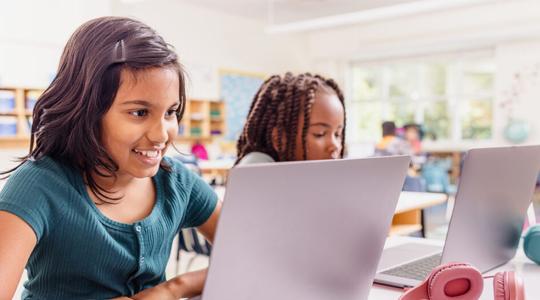
Imagine posing a question to the class: How can we represent the fraction two-thirds? Hands shoot up. You invite a few students to show how they would represent the fraction visually. Which students walked away from the lesson with an understanding of how to visually represent two-thirds, and which did not?
This is where educational technology can help. There are programs that can identify in real time which students are grasping the content and who needs extra help, who's engaged and who's off track. Some programs can act as a tutor for struggling students, gamify learning for the disengaged, and recommend more challenging content for those who are achieving.
“Technology holds the ability to track students’ learning and then recommend the right content or the right experience to move them forward,” says Greg Collins, HMH’s Senior Vice President, Platform. “This way, all students can rise together.”
How Important Is Technology in Education?
When you consider that a teacher might be responsible for the academic achievement of 30 or more students, the importance of technology in education is obvious.
“A teacher's got 30 different educational journeys happening at one time in their classroom,” Collins says. “The importance of a little bit more data to guide those journeys cannot be overstated.”
Instead of taking all these students on a one-size-fits-all journey, technology enables a more personalized learning experience. With the help of adaptive learning systems and educational apps, students can learn at their own pace and get instruction tailored to their individual needs.
“Tech tools allow teachers to be as effective as they can be,” Collins says. “The right technology allows students to be engaged and make the progress they need. Still, teachers remain central to making all this work.”
The Expanding Role of Technology in Education
The role of technology in education has grown exponentially in the past few years. The pandemic accelerated the rollout of digital devices and learning apps, making teachers more comfortable with technology. Many came to rely on the technology they were using for remote teaching, and continued to use the programs even after a full return to the classroom.
According to HMH's most recent Educator Confidence Report, teachers feel that technology has had a positive impact on education. In fact, 68% of educators reported that technology has become essential to their classrooms. They also look forward to new and improved tech solutions, with 63% of educators reporting that they're most excited to see easy-to-use technology for remote and in-school learning in the future.
“It’s no longer a question of ‘Do I need a remote solution or an in-class solution?’" Collins says. “Technology is just there, no matter where students are learning, and teachers are adopting it quickly.”

Examples of the Importance of Technology in Education
On the topic of why technology is important in education, who better to weigh in than educators? Here’s what they have to say about the programs they’re using in the classroom.
1. On Real-Time, Personalized Guidance: Nick Wheeler, a 6th grade ELA teacher at Bristow Elementary, in Kentucky, uses Writable to guide students through the writing process, from prewriting, to drafting, revising, editing, and publishing. He found that after using the program, students started taking the initiative to check their grammar and incorporate feedback from peers.
“Writable has helped our students take ownership of their writing because of the tools and supports available to them,” says Wheeler. “The process is efficient and students are proud of their final piece.”
2. On Gamified EdTech: When learning is fun, that can make all the difference for students. The gamified aspects of the Waggle program—building avatars, racking up points, and earning badges—“lit a spark” in Erin Bailey’s students. She’s an instructional coach in Blue Springs, Missouri.
“Kids would stop me in the hallways to tell me about their growth in Waggle and what they were doing in the program,” says Bailey. “And if they didn’t see me, kids were wanting their teachers to get in contact with me. That was such an awesome feeling.”
3. On AI-Driven Support: Leslie Perkins, an instructional coach at Rich Pond Elementary in Kentucky, describes Amira as a teacher’s assistant. The program can do oral reading fluency assessment, dyslexia screening in less than nine minutes, and even take running records. In all, Amira can save teachers more than 90 hours each year.
Teanna Curry, a 2nd grade teacher at Bristow Elementary, in Kentucky, appreciates the extra time the program provides her. “Amira allows me to focus on small-group and stay on task with that while the students are still learning,” says Curry.
4. On Using a Connected Platform: Bryce Marquis, director of educational programs in Jones County, North Carolina, says that when it comes to instruction, educators appreciate a streamlined experience like the one on Ed, HMH’s learning platform. “Our teachers have told us they’re happy they don’t have to purchase a lot of extra materials and that they don’t have to sign in to three to five platforms to find what they need,” says Marquis.
Share Thoughts on Technology in Education
What are your thoughts on the importance of technology in education? Do you and your students rely on tech in the classroom, or can you just as easily do without it? Share your experiences with us via email at shaped@hmhco.com or reach out on Twitter (@HMHCo) or Facebook.
***
Discover easy-to-administer assessments, best-in-class core instruction, personalized supplemental practice and intervention, and meaningful professional learning—all on one platform. Check out our suite of connected solutions.
Discover best practices for integrating AI in the classroom.














